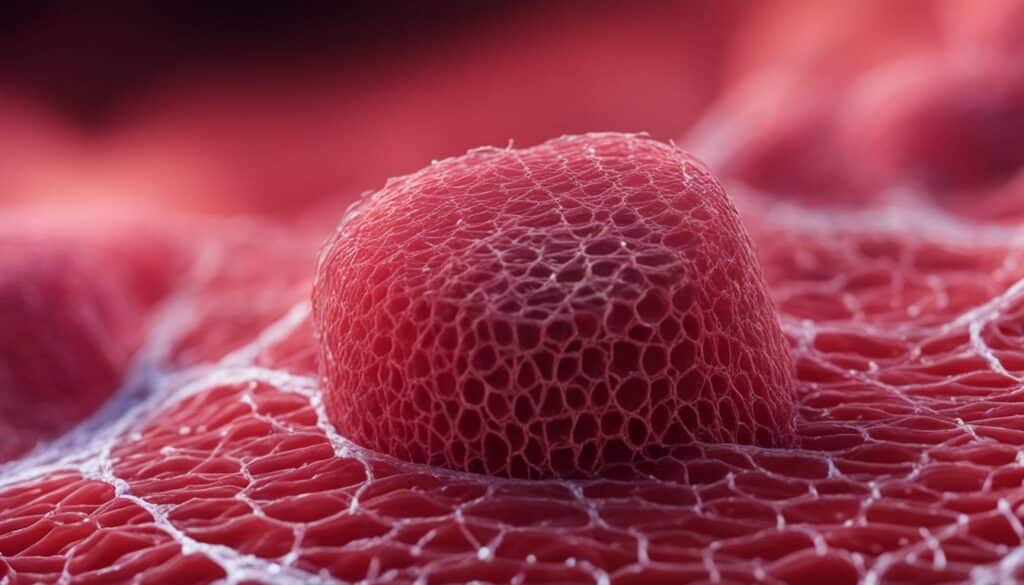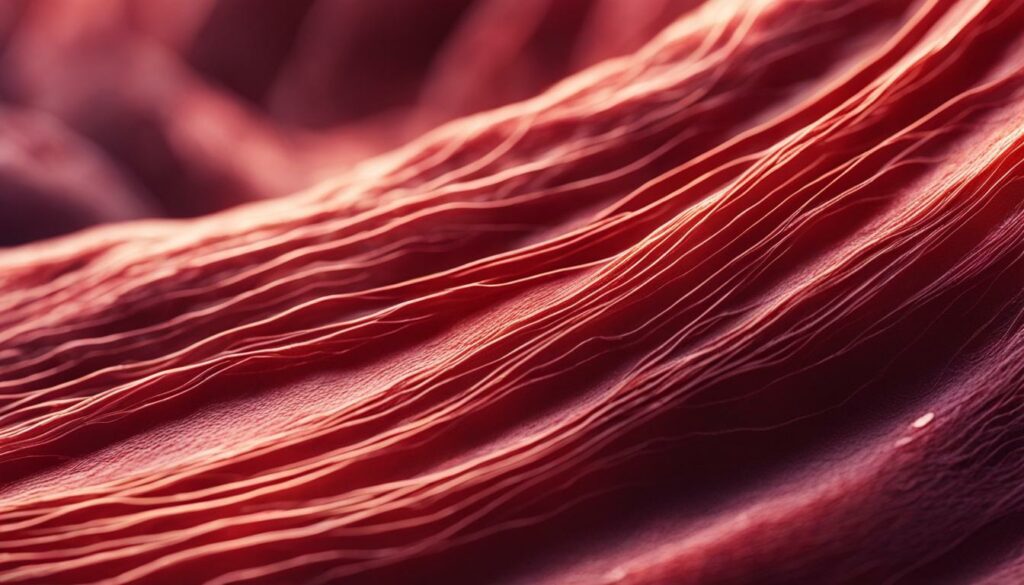You’re not alone if you’ve ever wondered why collagen is a popular ingredient in wound healing products. The truth is that collagen offers a wide range of benefits in the wound healing process, from enhanced tissue regeneration to faster recovery times and reduced scar formation.
Collagen is a vital component of our skin, providing strength and elasticity, making it a crucial component in wound healing. When our skin is damaged, our body triggers complex processes that aim to repair the wound and restore skin integrity.
In this article, we will explore the advantages of collagen in wound healing, shedding light on its healing properties and how it supports tissue regeneration and promotes faster healing. But before we dive into the benefits of collagen, let’s first understand the different stages of the wound healing process.
Understanding the Wound Healing Process
Wound healing is a complex process that involves a series of stages. Understanding each stage is crucial to promoting optimal wound healing outcomes. The four main phases of the wound-healing process include:
- Hemostasis
- Inflammatory Phase
- Proliferation Phase
- Remodeling Phase
During the hemostasis phase, the body primarily focuses on controlling bleeding. Platelets form a clot to prevent further damage and prepare the wound for healing. Next, during the inflammatory phase, the immune system is activated, and white blood cells attack any foreign invaders and remove debris from the wound. This phase leads to increased blood flow and swelling.
The proliferation phase is where new tissue begins to form. This phase is characterized by cells quickly replicating and laying down collagen and other extracellular matrix components.
The last phase, the remodeling phase, involves the strengthening and reorganizing of the newly formed tissue. Collagen plays an important role in this stage, providing tensile strength and supporting the healing wound.
Collagen and the Wound Healing Process
Collagen is crucial for proper wound healing. It is the most abundant protein in the body and provides much-needed support for the healing tissue. During the proliferation phase, cells quickly replicate and produce new collagen fibers. Collagen also helps to attract and bind cells to the wound area, facilitating tissue regeneration. By understanding collagen’s critical role in each wound healing stage, healthcare professionals can better optimize their treatment plans for patients.
The Role of Collagen in Wound Healing
Collagen is a crucial component in promoting wound healing, with its vital role in supporting tissue regeneration. Collagen helps regulate cell activity and promotes the deposition of extracellular matrix components critical for wound closure.
Additionally, Collagen facilitates the formation of new blood vessels, which nourish the wound, promoting faster healing. The resulting blood vessel network provides the nutrients and oxygen required for wound repair. Essentially, collagen acts as the building blocks in the wound healing process.
Moreover, collagen encourages the production of fibroblasts. These specialized cells produce the extracellular matrix components and restore a healthy tissue environment, leading to the closure of the wound and the regeneration of new tissue and blood vessels.

The image above illustrates collagen’s role in tissue regeneration, a crucial factor in the wound healing process. Collagen provides a framework for new tissue growth, promoting faster healing and better overall outcomes.
Enhanced Tissue Regeneration with Collagen
Collagen has gained attention for its healing properties in the wound healing process. It is known for stimulating the production of new cells and accelerating tissue regeneration, improving overall healing outcomes.
Collagen therapy for wound healing has shown promise in improving the healing process. Collagen-based products have been found to promote angiogenesis, the formation of new blood vessels, and enhance fibroblast proliferation, a type of skin cell crucial for wound repair.
In addition to its effects on cell growth and proliferation, collagen has also been found to increase the tensile strength of healing tissue. This means that wounds treated with collagen-based products have more excellent stability and are less likely to re-injure during healing.

Collagen for Faster Healing
The healing properties of collagen make it a popular choice for individuals seeking faster healing outcomes. Collagen dressings, creams, and gels have been found to enhance wound healing and reduce the time to full recovery.
The effects of collagen on wound healing make it a promising treatment for individuals with chronic wounds and those recovering from surgery or traumatic injuries.
Collagen’s Impact on Scar Formation
Scarring is a natural part of the wound-healing process. However, excessive or abnormal scarring can lead to aesthetic and functional issues. This is where collagen comes in.
Collagen helps minimize scar tissue and promotes better aesthetic results during wound healing. It enhances the formation of new skin by attracting and stimulating cells responsible for creating new skin tissue. Collagen produces a scaffold-like effect on the wound bed, allowing cells to migrate and grow in an organized manner, forming new skin tissue.
The use of collagen in wound healing has shown promising results in reducing abnormal scar formation. It helps to reorganize collagen fibers, resulting in more organized and aligned scar tissue.
So if you’re looking for a way to improve your wound healing process’s aesthetic and functional outcomes, incorporating collagen treatments and products could be beneficial.
Comparison of Scar Formation with and without Collagen Treatment
| Scar Characteristic | With Collagen Treatment | Without Collagen Treatment |
|---|---|---|
| Scar Thickness | Thinner and more uniform | Thicker and uneven |
| Scar Appearance | Less visible | More prominent |
| Scar Texture | Softer and smoother | Harder and rougher |
| Scar Sensation | Less sensitive | More sensitive |
Clinical Applications of Collagen in Wound Healing
Collagen-based treatments have been a popular choice in the medical field due to their effectiveness in promoting wound healing. Here are some of the clinical applications where collagen has been used for wound repair:
| Treatment Type | Description |
|---|---|
| Collagen dressings | These dressings contain collagen and can be applied to the wound directly. They help to reduce pain and inflammation and promote a moist environment, allowing the wound to heal faster. |
| Collagen injections | Collagen injections are used for wound repair and other medical applications. It stimulates the production of new cells, accelerates the healing process, and strengthens the wound tissue. |
| Collagen creams and gels | Collagen-based creams and gels can be used for chronic wounds, burns, and surgical wounds. They provide hydration and nourishment to the wound area, stimulate tissue repair, and reduce the risk of infection. |
The effectiveness of collagen therapy for wound healing has led to the development of various collagen-based products. These products provide an alternative or an add-on treatment option for wound care. Some benefits of using collagen for wound repair include faster healing, reduced scar formation, and improved overall healing outcomes.
Collagen Products for Wound Healing
Collagen-based treatments are increasingly popular for wound healing due to their potent regenerative properties. Collagen products can provide a supplemental source of collagen to accelerate the healing process when the body’s natural supply is insufficient.
Different collagen products include:
| Product Type | Description |
|---|---|
| Dressings | Collagen dressings contain fragments of collagen that stimulate the growth of new skin cells, keep the wound moist, and accelerate wound closure. These dressings can help reduce pain and minimize scarring. |
| Creams | Collagen creams can be topically applied to wounds and are readily absorbed by the skin. The collagen provides a moisturizing effect that promotes skin regeneration and minimizes inflammation. |
| Gels | Collagen gels can be applied directly to a wound and provide a protective barrier while supporting new cell growth. These products can help reduce pain and inflammation and promote faster healing. |
Collagen products offer a range of benefits for wound healing, including reduced healing time, improved tissue regeneration, and reduced scarring. Speak with your healthcare provider to determine which collagen product best suits your specific wound healing needs.
Conclusion
In conclusion, the benefits of collagen in the wound healing process are numerous. Collagen supports tissue regeneration, promotes wound closure, reduces scar formation, and facilitates the formation of new blood vessels. Its effectiveness in wound healing has led to various clinical applications, including collagen-based treatments and products such as dressings, creams, and gels.
Whether recovering from surgery or having a chronic wound that won’t heal, incorporating collagen-based treatments can help improve your healing outcomes. Talk to your healthcare provider about whether collagen therapy is right for you.
Remember, the wound healing process can take time and patience, but with the right care and treatment, you can achieve optimal healing results. Take care of yourself throughout the process, and don’t hesitate to reach out to your healthcare provider if you have any concerns or questions.

